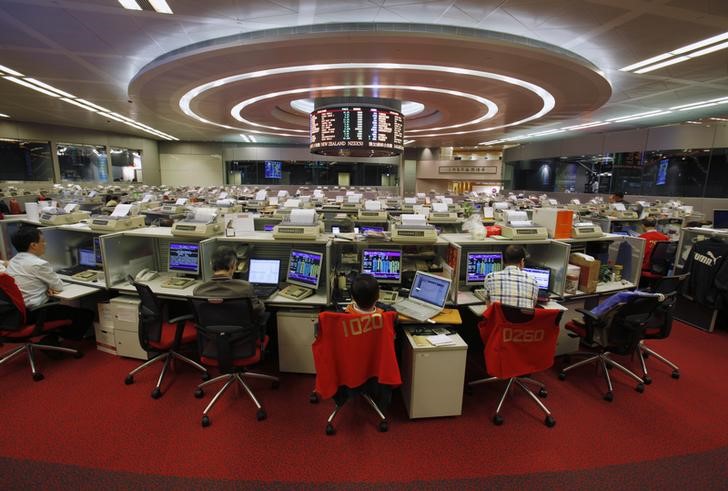By Nichola Saminather
SINGAPORE (Reuters) - Shares of Chinese companies listed in Hong Kong are among the top performers in the world so far this year, easily returning more than the S&P, as Chinese investors pile into a market that was once the near-exclusive playground of foreign fund managers.
Worried by signs that China is tightening monetary policy, mainland investors are loading up on Hong Kong-listed Chinese firms, which are trading at hefty discounts to the shares of the same companies in Shanghai and Shenzhen.
Chinese are also pouring funds into Hong Kong as a hedge against fears of further depreciation in the yuan currency. Most Hong Kong listings are denominated in the local dollar, which is pegged to the U.S. dollar.
The Hang Seng China Enterprises index, which tracks H-shares, has surged almost 13 percent this year. The NASDAQ is up just over 11 percent and the S&P 6 percent.
That rally has narrowed the premium commanded by China's A-shares over H-shares to the lowest since December 2014, but investors say there is still money to be made.
Chinese investors remain wary of local shares after a crash wiped trillions of dollars off its markets in mid-2015, said Nicholas Yeo, head of China/Hong Kong equities at Aberdeen Asset Management in Hong Kong.
"We've seen a reduction in participation by retail investors in A-shares. They have been replaced by institutional investors, who are looking to Hong Kong, where H-shares have been trading at a discount for some time."
JUICY DISCOUNTS
Tight capital controls have limited the ability of Chinese to get funds out of the country, prompting them to pour their savings into A-shares and driving those prices and valuations significantly higher than H-shares.
But in the last few years, programs connecting the Shanghai and Shenzhen stock markets to Hong Kong's have gained traction, giving Chinese a route to invest overseas, with the proviso they repatriate the funds to prevent actual capital outflows.
The juicy discounts seen in Hong Kong have been too good to pass up.
Using the stock market link-ups, Chinese investors pumped $7.19 billion into Hong Kong stocks in January and February, some 40 percent more than foreigners invested in mainland shares.
The Shanghai Shenzhen CSI 300 index is up only 4.2 percent so far this year.
FOREIGNERS RETURNING TO GATEWAY TO CHINA
Adding to the boost for Hong Kong stocks, foreign funds, which reduced exposure to Asia late last year as the U.S. dollar strengthened, are now returning, drawn both by expectations of global reflation and China's steadier economy.
That has whittled down the A-share premium over H-shares to 14 percent, compared with about 35 percent a year ago.
Chinese buyers have been largely focusing on H-shares of China's banks for their relatively high dividend yields.
International investors, on the other hand, view Chinese banks with scepticism, fearing their bad loans are much higher than the lenders admit.
For instance, after a price gain of 15 percent in the last three months, Industrial and Commercial Bank of China's H-shares are now trading at 5.8 times forward earnings, compared with 4.7 times a year ago.
For ICBC's A-shares, the closely watched metric has seen only a slight change to 6.
"The shrinkage in the premium has been very narrow in focus. Banks are the big movers behind that," said Tan Eng Teck, senior portfolio manager at Nikko Asset Management in Singapore. "But there's still a premium in other sectors."
Overall, the H-share index is trading at 8.3 times earnings, up from 7.4 times at the start of the year.
Shanghai-listed A-shares are at 12.9 times, versus 13.2 times at the beginning of 2017, and Shenzhen-listed A-shares are at 23.6 times compared with 24.5 earlier.
Given that H-shares remain cheaper than A-shares, investors should still focus on the former, Tan said.
"Eventually, A-shares will come down to meet H-shares, so you wouldn't want to buy A-shares," he said.
While H-shares still look more attractive, the recent surge is leading international investors to contemplate the day when the arbitrage opportunity closes altogether.
When that happens, some mainland shares will start to look attractive, said Arthur Kwong, head of Asia Pacific equities at BNP Paribas (PA:BNPP) Investment Partners in Hong Kong.
"When it closes, we would be looking for unique stocks listed only in China," Kwong said. "In Shenzhen, there are many medium-sized companies not listed in Hong Kong, with very good fundamentals. It will be more about stock hunting."
While most analysts believe Hong Kong's rally has room to run, a reversal in bearish expectations for the yuan is a risk factor, Tan warned.

If Chinese investors think the yuan has bottomed, "the chances of them taking profits in Hong Kong and going back are higher," he said.